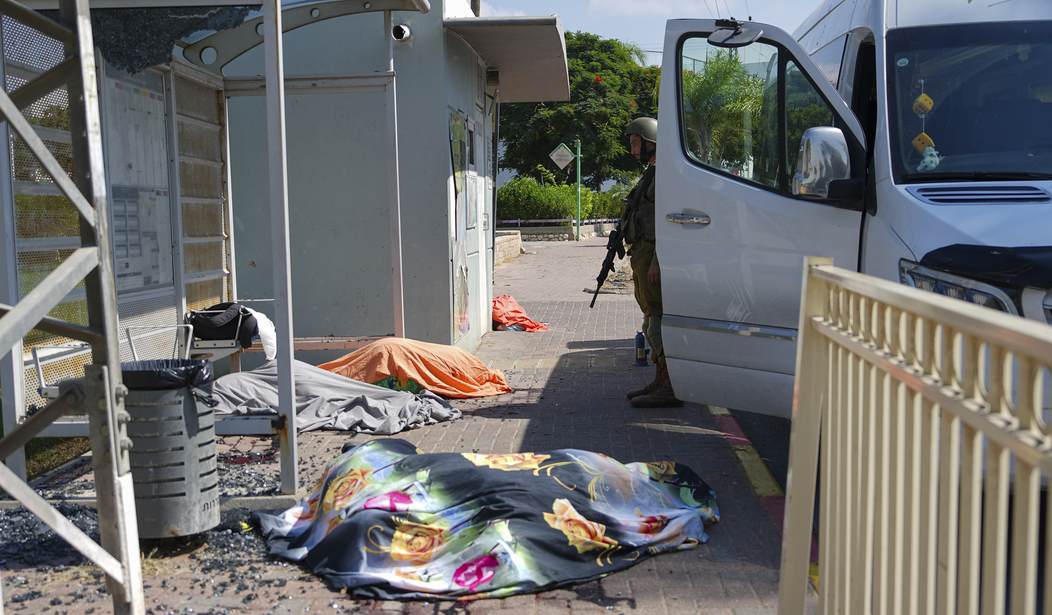After an Israeli air strike in Syria on Monday killed Mohammad Reza Zahedi, a senior commander in Iran's Revolutionary Guard Corps, a hardline Iranian political coalition has seemingly admitted that Iran played a significant role in Hamas' attack on Israel on October 7.
In a statement on Thursday memorializing Zahedi, the Coalition Council of Islamic Revolution Forces (SHANA) said he played a "strategic role in...designing and implementing" the barbaric ambush attack on Israeli civilians:
Major General Mohammad Reza Zahedi with a group of others His warriors received the reward of years of sincere struggle...
Martyr Zahedi's strategic role in forming and strengthening the resistance front, as well as designing and implementing the Al-Aqsa storm, are great honors that will make the silent efforts of this great commander immortal in the history of the anti-occupation regime.
The deadly blows that are inflicted on the occupiers of Jerusalem these days have pushed the Zionist crime leaders to the border of helplessness and desperation, and the cowardly attack on the consulate of the Islamic Republic of Iran in Damascus is a clear proof of this claim.
Supporters of Tel Aviv should know that the harsh and regretful response of the Islamic Republic of Iran to this bloody crime is on the way.
For those not familiar, Hamas calls the attack the "Al-Aqsa Storm."
A Wall Street Journal exclusive in October reported that senior IRGC officers helped plan the attacks and gave the final green light during a meeting in Beirut the Monday before they were carried out. National security sources in the United States have told RedState on condition of anonymity that the U.S. has found evidence that Iran led a great deal of the intelligence preparation for the attacks, including communications protocols, SIGINT support, and cyber attacks. The Iranian government has officially denied any involvement.
A Reuters story published in Japan Times revealed some interesting information (or, confirms what thinking people already knew intuitively) about who was with Zahedi in Syria, where they were, and what they were doing - despite claiming Israel bombed a diplomatic installation.
Zahedi had arrived in Syria a day or so before the attack and was staying at the embassy compound with two other senior commanders, according to an Iranian source who, like others in this story, asked not be identified because of the sensitivity of the issue.
The three men were in Syria to discuss operational logistics and coordination, the source said, without elaborating. Zahedi was a top figure in the Guards' Quds Force, which funnels Iranian support to allies around the region, including to Lebanon's Hezbollah.
Tensions have rapidly escalated in the days since the bombing. Iran vowed to retaliate against both Israel and the United States for Zahedi's assassination (which Israel could well claim is part of a formally declared war), and Israel has canceled all weekend leave for its combat soldiers. On Thursday, after a phone call in which President Joe Biden admonished him to get to an immediate cease-fire with Hamas, Israeli Prime Minister Benjamin Netanyahu emphasized that Israel's hostilities aren't just with Hamas, but with Iran as well. Via Axios:
Israeli Prime Minister Benjamin Netanyahu said at the top of an Israeli security cabinet meeting on Thursday that Iran has been operating against Israel for years "both directly and via its proxies, and therefore Israel is operating against Iran and its proxies, both defensively and offensively."
On Friday evening CNN reported that a senior Biden administration official told the network that the United States is on "high alert and actively preparing for a 'significant' attack that could come as soon as within the next week by Iran targeting Israeli or American assets in the region."
Seattle radio host Bryan Suits, a US Army veteran who served in Bosnia, Kuwait, and Iraq, noted a change in the IRGC's logo and what that might mean.
IRGC has changed their logo to crimson red. In Shi'a that could mean several things, none good. Angry sermons given today in Tehran and Najaf, Iraq to militia.
— Bryan Suits KTTH Seattle (@darksecretplace) April 5, 2024
Coordinated UAV and medium range ballistic missile attacks are looming. Israel is prepping for a Hizbollah, Iraqi… pic.twitter.com/6J9swyfCBA
Suits wrote:
IRGC has changed their logo to crimson red. In Shi'a that could mean several things, none good. Angry sermons given today in Tehran and Najaf, Iraq to militia. Coordinated UAV and medium range ballistic missile attacks are looming. Israel is prepping for a Hizbollah, Iraqi militia to make it a triple whammy.
The verbiage in IRGC's tweet is translated to read: "They will find no guardian or helper."















Join the conversation as a VIP Member